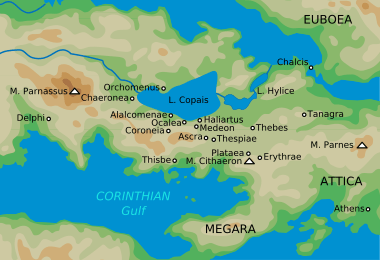Boeotian War
| Boeotian War | |||||||
|---|---|---|---|---|---|---|---|
 Epaminondas defending Pelopidas at the Siege of Mantinea (385 BCE), William Rainey | |||||||
| |||||||
| Belligerents | |||||||
| Peloponessian League | Boeotian League | ||||||
| Commanders and leaders | |||||||
|
Agesilaus II Cleombrotus I |
Epaminondas Pelopidas Pammenes | ||||||
| Casualties and losses | |||||||
| unknown | unknown | ||||||
The Boeotian or Theban War broke out in 378 BCE as the result of a revolt in Thebes against Sparta. The war would last over six years.[1]
Outbreak of the War

Upon the seizure of the Theban citadel by the Spartans (383 or 382 BCE), Pelopidas and other leading Theban democrats fled to Athens where Pelopidas took the lead in a conspiracy to liberate Thebes. The Spartans were ruled by kings and, therefore, were supportive of oligarchic governments in other Greek cities. In 379 BCE the democratic party surprised and killed their chief political opponents in Thebes (members of the aristocratic party that supported the Spartans), and roused the people against the Spartan garrison, which surrendered to an army gathered by Pelopidas.[2]
A Spartan expedition against Thebes was mounted, led by the Agiad Spartan king Cleombrotus. It achieved little but left a garrison in Thespiae under Sphodrias.[3] That winter Sphodrias attempted a raid on Piraeus which ended in a fiasco.[4] Sphodrias had not acted under orders and was brought to trial. However, he was acquitted, which led Athens to declare for Thebes.[5]
The War
The Spartan Eurypontid king Agesilaus led two expeditions against Thebes but achieved little.[6] It is likely that the Dema wall was built at this time to defend Attica.[7] An expedition in 376 BCE led by King Cleombrotus was blocked at the passes of Cithaeron.[8] As the Spartans failed to get over the Cithaeron Mountains, this gave the Thebans the chance to take the attack to the Spartans, and in doing so they conquered the Spartans' remaining strongholds in Boeotia while the Spartan base in Thespiae was also lost. The Spartans were only left with some land in the south and Orchomenus in the north-west.[9]
Because the Spartans were having a hard time attacking Thebes over land, they decided to change their strategy and rather use a naval force to try and block support for the Athenians. In response, the Athenians sent a powerful fleet towards Sparta. The Spartan general Pollis then led his small fleet to try and stop the siege, but was killed during a naval battle against the Athenian general Chabrias. This naval victory was the first ever victory by an Athenian naval fleet since the Peloponnesian War. Later in 376 BCE Chabrias raided Laconia, and possibly reached Sellasia which is to the north-east of Sparta.[10] In 375 BCE Athens mounted two successful expeditions - one into the northern Aegean under Chabrias and a second which sailed around the Peloponnese to western Greece. This force was led by Timotheos, son of Conon, who won the battle of Alyzeia in Acarnania.[11]

In 375 BCE there was a renewal of the King's Peace, but this lasted but a few months.[12] The capture of Plataea by the Thebans put the Theban-Athenian Alliance under strain,[13] as the Plataeans were expelled from their city and found asylum in Athens, where they were a strong voice against Thebes.[14] Though the alliance held, Athens insisted on negotiations with Sparta.[15] A peace treaty was agreed but significant disagreements arose at the treaty signing. Epaminondas insisted that he should sign for the Boeotians as a whole rather than just for Thebes. In response, the Spartan king Agesilaus struck the name of Thebes off the list of signatories.[16] Both sides then left the conference and prepared for renewed hostilities.
As a result of the failure to come to terms with Thebes, the Spartans under Cleombrotus marched against Thebes in 371 BC. Cleombrotus was defeated at Leuctra by the Boeotians led by the Thebans and Spartan supremacy effectively overthrown and usher in an era of Theban hegemony.[17]
Notes
- The Historians' History of the World, vol. 4, p. 140
- Kennell (2010), p. 139
- Kennell (2010), p. 140
- Kennell (2010), p. 140
- The Historians' History of the World, vol. 4, p. 140
- The Historians' History of the World, vol. 4, p. 142
- Mark H. Munn, The Defense of Attica: The Dema Wall and the Boiotian War of 378-375 BC (Berkeley: University of California Press, 1993)
- The Historians' History of the World, vol. 4, p. 142
- "Battle of Alyzeia". The history of war. June 22, 2016. Retrieved December 4, 2016.
- "Boeotian war". History of War. 20 May 2016.
- Agesilaos, P Cartledge p377
- Kennell (2010), p. 142
- Kennell (2010), p. 142
- The history of ancient Greece: its colonies and conquests, from the earliest, By John Gillies p 323
- Kennell (2010), p. 142
- Kennell (2010), pp. 142-143
- Kennell (2010), pp. 143-145
Sources
- Nigel Kennell, Spartans, a new history, 2010
- Henry Smith Williams (Ed.) The Historians' History of the World, vol 4